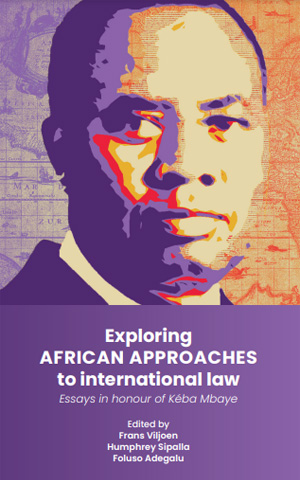Exploring African approaches to international law: Essays in honour of Kéba Mbaye
Edited by Frans Viljoen, Humphrey Sipalla and Foluso Adegalu
2022
ISBN: 978-1-7764116-9-6
Pages: 358
Print version: Available
Electronic version: Free PDF available
About the publication
It is unfortunate that the idea that Africa contributes to international law, and has always done so, remains (in 2022) largely a side note, an auxiliary approach, rather than something widely accepted and deeply entrenched. It is cause for pause that this is also true in Africa itself. Exploring African approaches to international law: Essays in honour of Kéba Mbaye is a volume of essays that aims to contribute to a larger effort of imagining what possible approaches to international law Africa has adopted in the decades since the 1960s. It also recognises the legacy of the great Senegalese jurist Kéba Mbaye.
Edited by Frans Viljoen, Humphrey Sipalla and Foluso Adegalu, the volume is divided into five broad thematic parts, and comprises eleven chapters. It covers the following themes: ‘Kéba Mbaye in African approaches to international law’, ‘international legal theory’, ‘international human rights law’, ‘international environmental and criminal law’ and ‘teaching of international law’.
This publication finds its origins in the 2017 Roundtable on African approaches to international law, held at the Centre for Human Rights, University of Pretoria. The explorations at the Roundtable on the concept of an ‘African approach’ to international law were taken further at the Kéba Mbaye Conference on African approaches to international law, held at the Senate Hall, University of Pretoria, in December 2018. This conference brought together around 80 students, academics, and members of civil society to address the many questions left unanswered by the death of Judge Mbaye, arguably Africa’s greatest international law jurist of his generation. It provided a forum to continue discussions on ‘African approaches to international (human rights) law’, building on but rethinking and ‘vernacularising’ the Third World Approaches to International Law (TWAIL) approach. The contributions to this publication flow from papers presented at the conference. However, the reflections in the book extend beyond Kéba Mbaye as central figure. The result is a broad treatment of various aspects of African approaches to international law by thirteen authors (and co-authors), covering a wide range of generational, geographic and thematic backgrounds and perspectives. un
Table of Contents
Preface
Chris Maina Peter
Introduction: Exploring African approaches to international law
Frans Viljoen, Humphrey Sipalla and Foluso Adegalu
Kéba Mbaye in African approaches to international law
1 Towards an African professional history of international law: The life and work of Kéba Mbaye
Humphrey Sipalla
2 Square pegs for square holes: An ‘African’ approach to gender responsiveness
Mariam Kamunyu
Kehinde Olaoye
Exploratory perspectives on international legal theory
4 Changing of the guard: A geopolitical shift in the grammar of international law
Rashmi Raman
Exploratory perspectives on international human rights law
6 A tale on belonging in Africa: An analysis of the African approach to statelessness
Mumbi Gichuhi and Sandra Bucha
7 Gacaca and Judiyya transitional justice: Uncovering the merits of African indigenous justice systems with the help of the receptor approach to human right
Serges Djoyou Kamga and Tom Zwart
Exploratory perspectives on international environmental and criminal law
8 When the T(W)AIL wags global environmental governance
Basil Ugochukwu
Exploratory perspectives on teaching of international law
10 Africa’s human rights framework as an entry-point to decolonising education
Emma Charlene Lubaale
11 Rethinking international law education in Africa: Towards a dialogic approach
Babatunde Fagbayibo
Conference Report
Kéba Mbaye Conference Report
